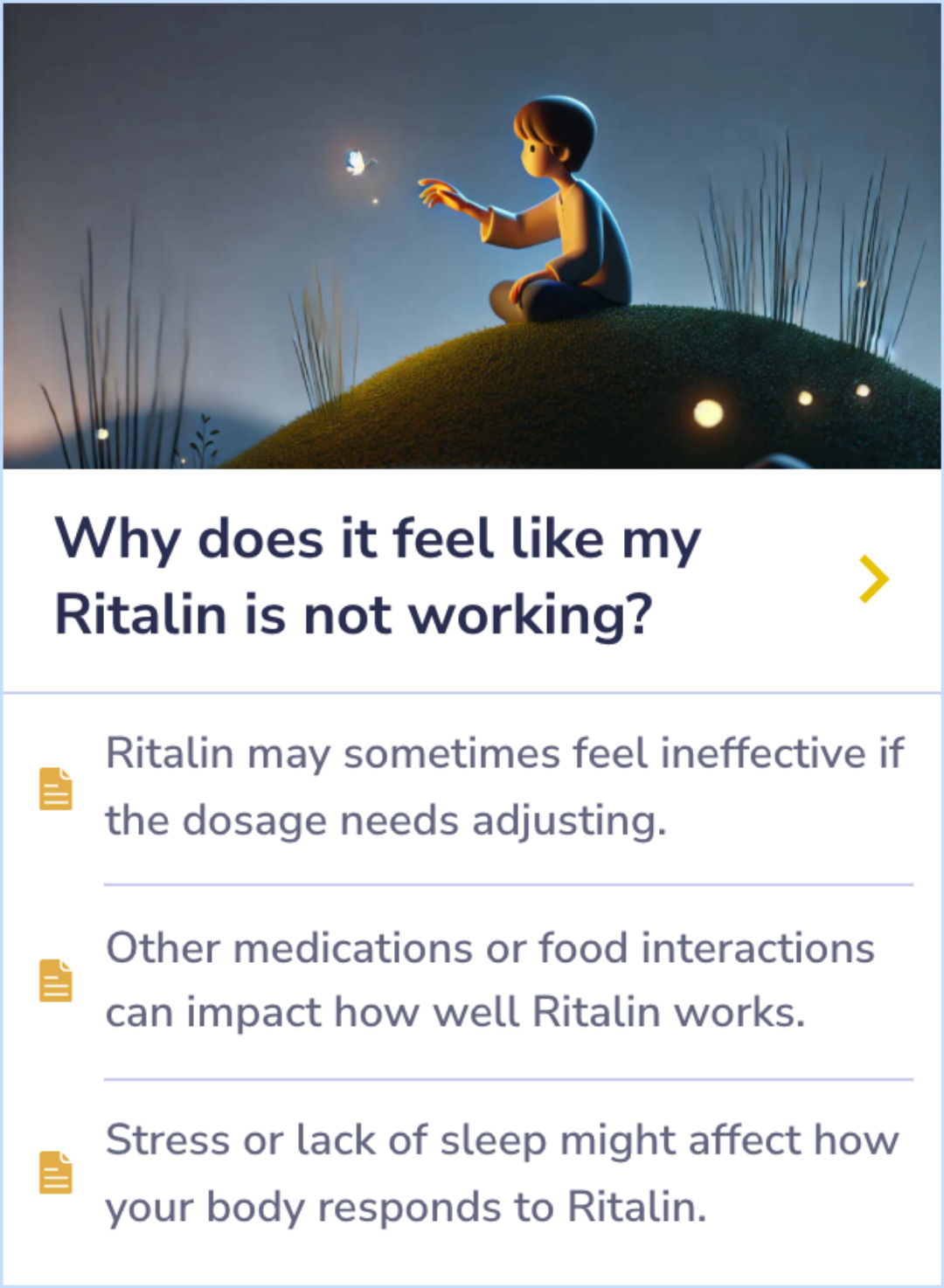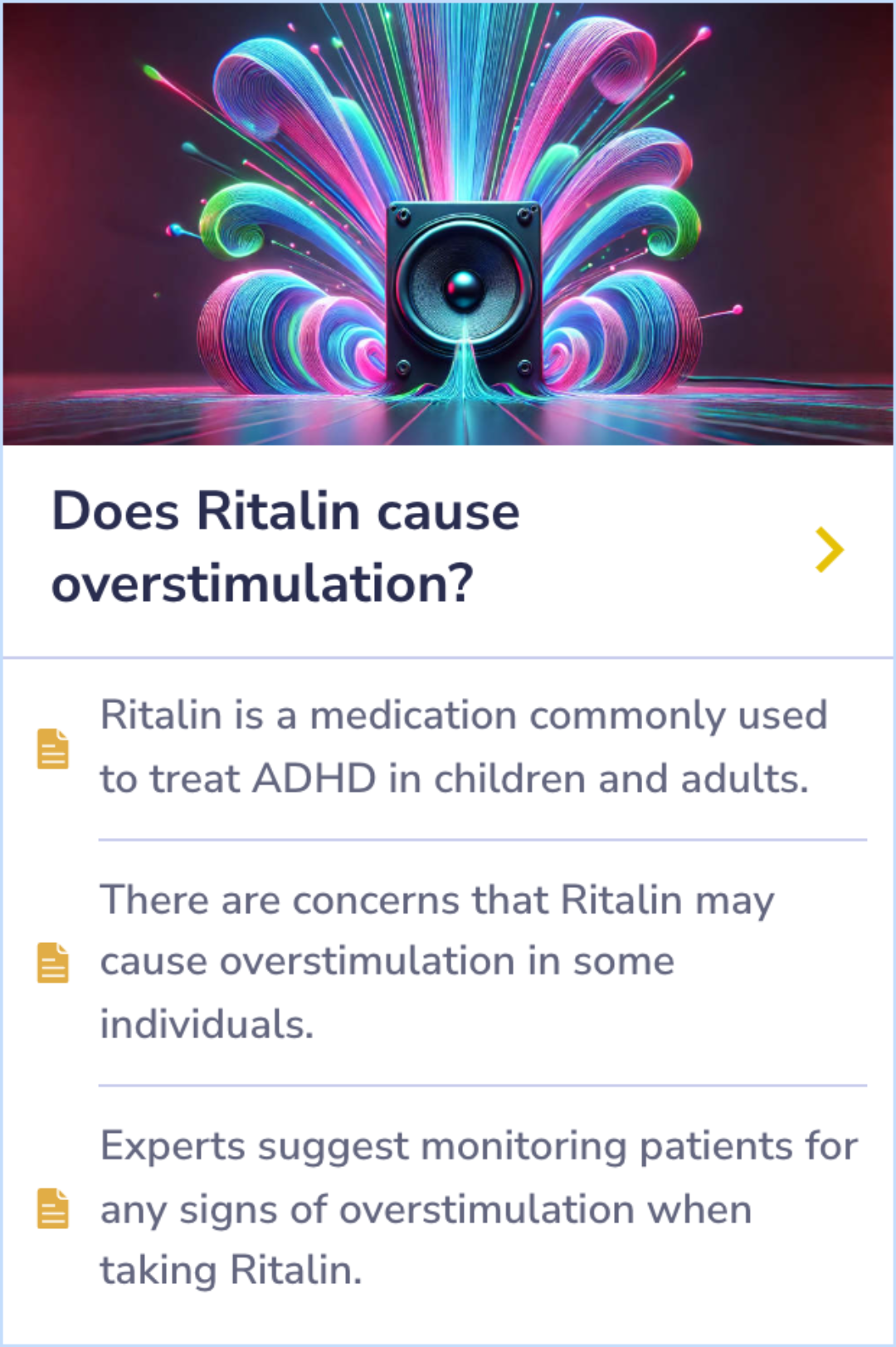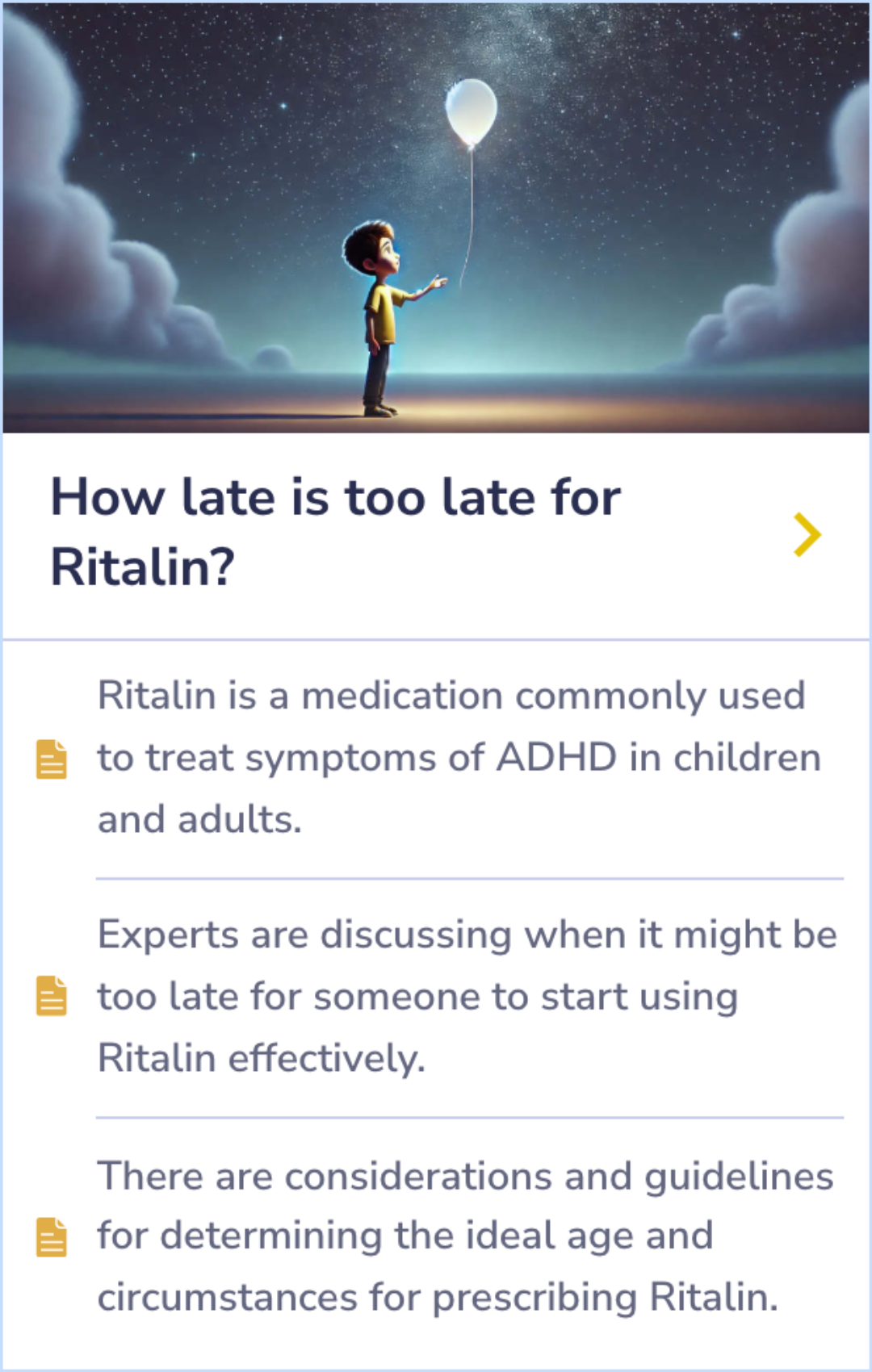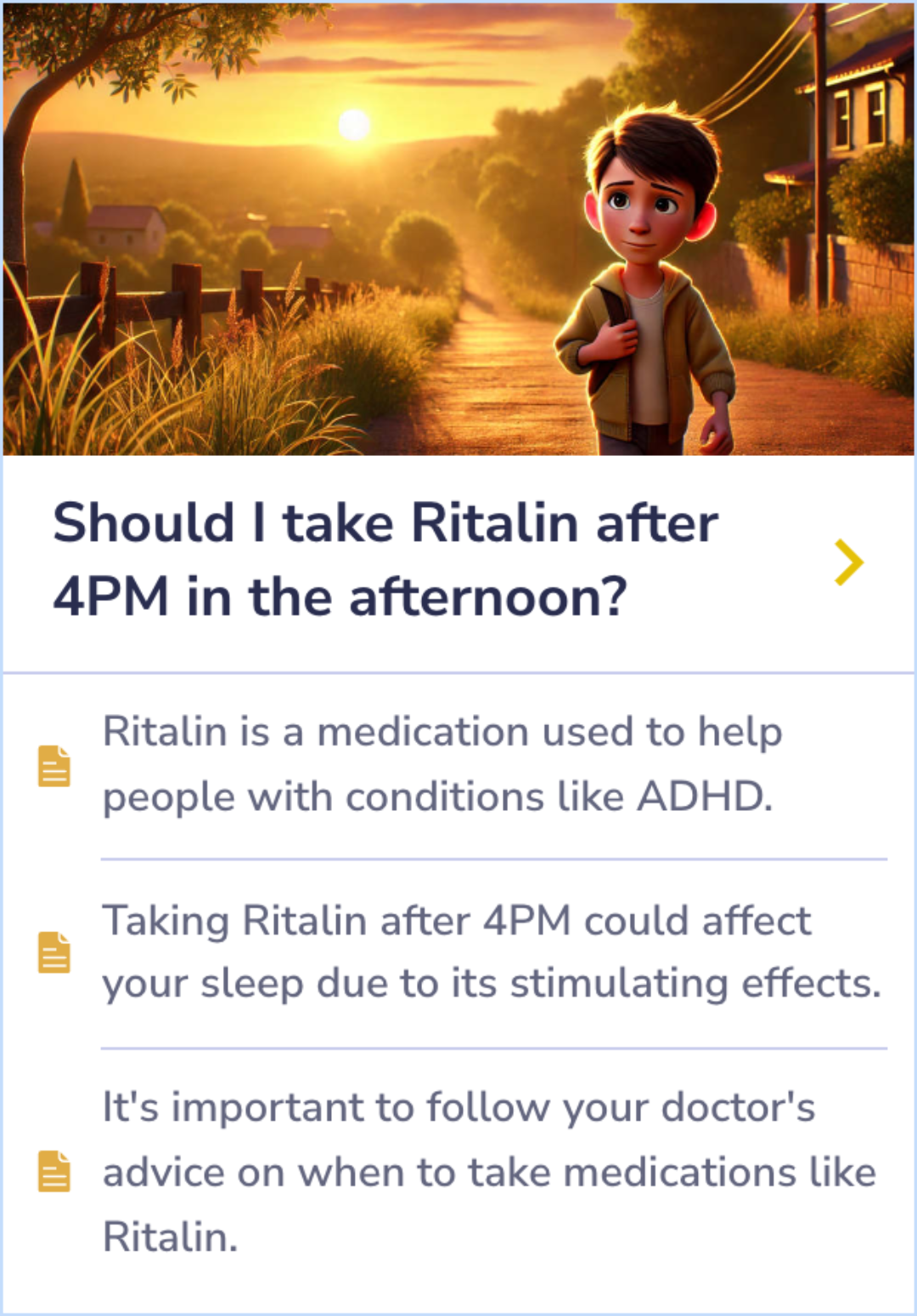Ritalin
Evidence Based Answers
Why is Ritalin making me tired?
Taking Ritalin without ADHD may not enhance cognitive abilities and can introduce risks like fatigue due to overstimulation and dosage challenges.
Published: November 7, 2024
Click to explore a section:
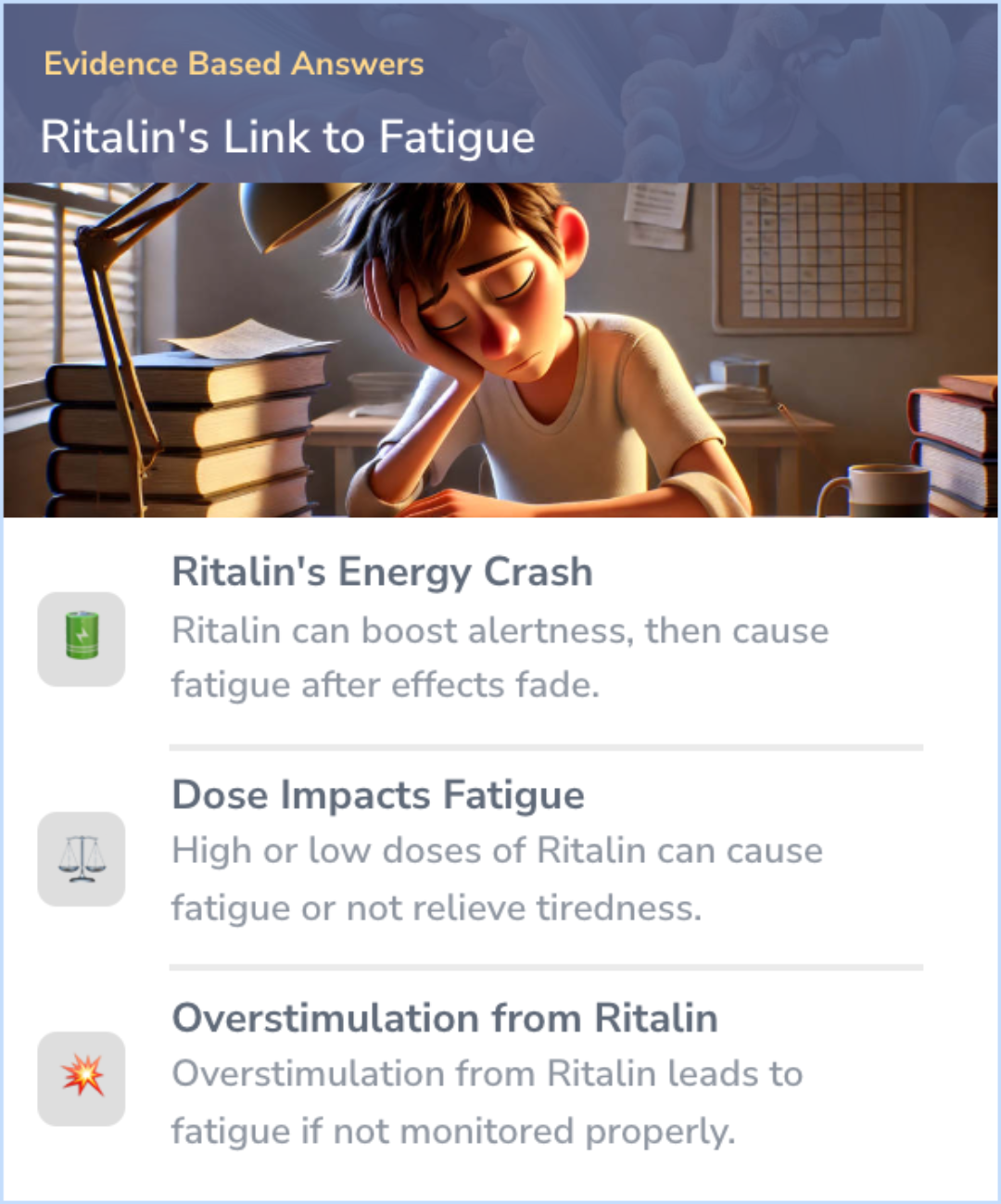
Ritalin's effects, dose-dependent, can cause fatigue due to overstimulation or improper dosage.
Background: Why Ritalin May Cause Fatigue
Ritalin (methylphenidate) typically works by increasing dopamine levels to improve focus and alertness. However, some individuals may experience fatigue as a side effect. This could be due to overstimulation causing a 'crash' after the initial effects wear off, or because of how the drug is metabolized, leading to fluctuating energy levels throughout the day.
Responses can vary widely between individuals, which makes it important to find the right dosage to minimize these effects.
Responses can vary widely between individuals, which makes it important to find the right dosage to minimize these effects.
“
Source Quotes:
There is a great deal of individual variability in response to methylphenidate, and therefore dosage must be titrated for optimal effects in each child, avoiding possible adverse effects.
It is, however, subject to marked individual differences in the response so that some subjects experience anxiety, dysphoria and tiredness.
Background: Overstimulation and Fatigue with Ritalin
Ritalin may paradoxically cause fatigue due to overstimulation. The initial increase in dopamine can enhance focus and energy but may be followed by a crash as the effects wear off. This cycle of high and low energy can lead to fatigue, particularly if the dosage is not properly adjusted.
Variability in how quickly the drug is absorbed and metabolized also contributes to changes in energy levels, requiring careful monitoring.
Variability in how quickly the drug is absorbed and metabolized also contributes to changes in energy levels, requiring careful monitoring.
“
Source Quotes:
General Disorders and Administrative Site Conditions: Asthenia, Fatigue, Feeling jittery, Thirst.
There is also evidence that methylphenidate disrupts attention in healthy people and some reports of the negative subjective experiences of anxiety, dysphoria and tiredness.
Background: Impact of Dosage Variability on Fatigue
The effect of Ritalin can be heavily influenced by the dose. A high dose may lead to overstimulation and mental burnout, causing fatigue, while a low dose may fail to effectively address symptoms, leading to tiredness. Finding the right dose for each individual is critical for managing these side effects.
Variability in how people metabolize and respond to Ritalin makes predicting consistent effects challenging.
Variability in how people metabolize and respond to Ritalin makes predicting consistent effects challenging.
“
Source Quotes:
Dosage must be titrated for optimal effects in each child, avoiding possible adverse effects.,It is unclear whether this variability is predominantly pharmacokinetic or pharmacodynamic.
Background: Managing Fatigue Side Effects of Ritalin
Fatigue related to Ritalin use may be influenced by other side effects, such as insomnia, anxiety, and mood swings. Poor sleep caused by insomnia can leave individuals feeling tired, while irritability and other mood fluctuations can exacerbate fatigue.
Awareness of these side effects is key to adjusting treatment and finding strategies to better manage fatigue.
Awareness of these side effects is key to adjusting treatment and finding strategies to better manage fatigue.
“
Source Quotes:
Insomnia and nervousness are the most commonly reported adverse effects in patients using methylphenidate.,Patients are more prone to become easily agitated, irritable, or depressed and go through mood swings/lability.
Adverse reactions in double-blind clinical trials (>5%) in adult patients were decreased appetite, headache, dry mouth, nausea, insomnia, anxiety, dizziness, weight decreased, irritability, and hyperhidrosis.
Personal Experiences
Perspectives: Perspectives on Ritalin Fatigue
In discussions on Ritalin-induced tiredness, viewpoints vary.
Some suggest dosage adjustments or switching medications, while others find tiredness a typical side effect indicating effectiveness. Additionally, comparisons with other stimulants like Adderall reveal diverse experiences.
Some suggest dosage adjustments or switching medications, while others find tiredness a typical side effect indicating effectiveness. Additionally, comparisons with other stimulants like Adderall reveal diverse experiences.
Reddit: u/jayemeff6
You may need a short acting ritalin for the afternoon. Your dose is quite low so potentially may need to adjust the LA.Key Takeaways
Conclusions
Although Ritalin boosts dopamine to enhance alertness, it paradoxically can cause fatigue. This is largely due to an initial overstimulation leading to a subsequent energy 'crash' as the effects wear off.
Additionally, individual variability in metabolism and response to the drug can result in fluctuating energy levels, highlighting the importance of tailored dosage management and awareness of associated side effects.
Additionally, individual variability in metabolism and response to the drug can result in fluctuating energy levels, highlighting the importance of tailored dosage management and awareness of associated side effects.

Evidence Summary
Factors That Impact Ritalin’s Effectiveness
Ritalin's effectiveness can fluctuate due to several factors. Sometimes, the dosage might need adjustments to meet an individual's specific needs.
Other factors, like medications or certain foods, may interfere with how well Ritalin works. Interactions with these can reduce its intended effects.
External influences, such as stress levels or lack of sleep, also play a role in how the body responds to Ritalin, impacting its effectiveness and stability.
Other factors, like medications or certain foods, may interfere with how well Ritalin works. Interactions with these can reduce its intended effects.
External influences, such as stress levels or lack of sleep, also play a role in how the body responds to Ritalin, impacting its effectiveness and stability.
Evidence Summary
Monitoring Ritalin for Overstimulation Risks
Ritalin is widely prescribed to treat ADHD in both children and adults. However, some individuals may experience overstimulation, which can manifest in various ways. Monitoring patients closely is recommended to identify signs of overstimulation early.
Experts emphasize that careful oversight of Ritalin treatment can help manage any potential overstimulation effects, ensuring that therapy remains effective and safe.
Experts emphasize that careful oversight of Ritalin treatment can help manage any potential overstimulation effects, ensuring that therapy remains effective and safe.
Evidence Summary
Timing and Effectiveness of Ritalin Treatment
Ritalin is a common treatment for ADHD, but there is ongoing discussion about the best age to begin therapy to maximize its effectiveness and ensure safety. Guidelines offer direction on when starting Ritalin may no longer be optimal.
Age considerations and expert recommendations are in place to guide the timing of treatment, emphasizing both therapeutic impact and potential safety concerns when prescribing Ritalin.
Discussions focus on when Ritalin initiation is most beneficial and how timing affects its outcomes.
Age considerations and expert recommendations are in place to guide the timing of treatment, emphasizing both therapeutic impact and potential safety concerns when prescribing Ritalin.
Discussions focus on when Ritalin initiation is most beneficial and how timing affects its outcomes.
Evidence Summary
Timing Matters: Ritalin and Sleep Disruption
Ritalin's stimulating effects can interfere with sleep if taken too late in the day. It emphasizes the need to follow medical advice on timing to avoid potential sleep disturbances. Taking it after 4PM could lead to sleep issues due to its stimulating nature.
This medication helps manage conditions like ADHD by increasing alertness, but the timing of doses is key to minimizing unwanted side effects, such as difficulty sleeping.
Always adhere to your doctor's recommendations on when and how to take medications like Ritalin.
This medication helps manage conditions like ADHD by increasing alertness, but the timing of doses is key to minimizing unwanted side effects, such as difficulty sleeping.
Always adhere to your doctor's recommendations on when and how to take medications like Ritalin.
